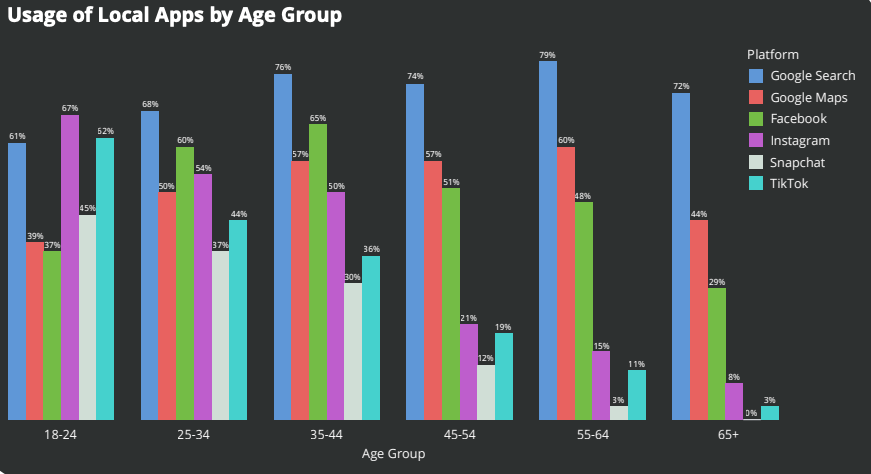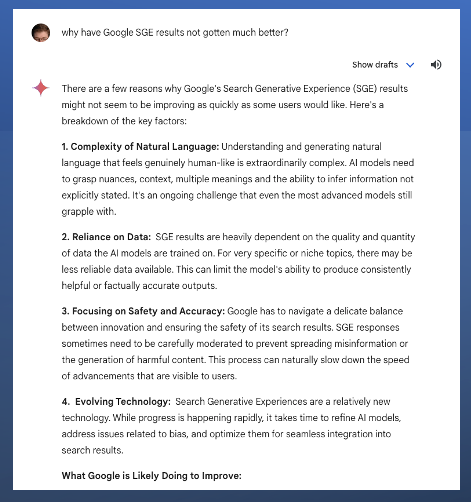Google's <30 Problem, AI + Search Marriage, Next & SGE Mediocrity

Google's <30 Problem
Contrary to early pronouncements, when ChatGPT came out, Google is in no danger of immediately being disrupted by AI. But there are worrying signs for the company when it comes to GenZ longer term. Multiple surveys indicate younger people are using a broader array of sources (mostly social media) as search engines or search alternatives. The survey data come from Adobe, Tinuiti and SOCi, which most recently reported that 18 - 24 year olds were using Instagram and TikTok before Google for local search. Now, youth research firm YPulse echos those earlier results, finding that GenZ are using multiple Google alternatives, including TikTok and other social media, though they also use YouTube (a Google property) to search. According to a discussion of the survey findings, "46% of those ages 18-24 start their information quests [ ] on Google ... that's compared with 58% of those ages 25-39; 21% of 18- to 24-year-olds start with TikTok, while 5% start on YouTube." In other words, no single site has captured the non-Google usage. Other studies have also shown that GenZ members are among the most enthusiastic and heaviest users of AI, including ChatGPT. Interestingly, Google said last year that 18-24 year olds gave the "highest satisfaction scores" for SGE.

Our take:
- The YPulse survey discussion attributes GenZ's changing behavior to "relatable [social media] answers amid dissatisfaction" with Google results.
- There's some anecdotal evidence that dissatisfaction is driving users to other platforms, but surveys typically don't tell the whole story.
- Google's comment that 18-24 year olds like SGE is also interesting. One can see a relationship between social media and conversational search.
Marriage of AI & Search
Google CEO Sundar Pichai sees AI and search as distinct but complementary. In a wide ranging but largely non-confrontational interview at Stanford (h/t SEJ), he speaks about multiple topics, from how Google innovates with nearly 200K employees to AI and the future of search. Pichai says, fundamentally, that AI is not a replacement for search. Chatbot answers, he argues, are good for factual information (but see, hallucinations), but search can offer a multiplicity of perspectives for more nuanced or complex queries. He implies the combination of web search and AI will enable Google to maintain its dominant position as the entry point for discovery on the web. (This POV suggests SGE will not go behind a paywall). Indeed, he sees Google SGE as a kind of evolution of universal search and featured snippets. Pichai also believes that Google's AI infrastructure – Ben Thompson explores that topic in depth – is critical to the company's ability to compete and win in the future. Pichai further explains that what's novel about AI is that it's "one [ ] piece of technology which can improve Search, can improve YouTube, can improve Waymo." In other words, there's enormous leverage here for Google. The interview begins at 1:18 below; the discussion about how AI is impacting the trajectory of search begins around 1:33.
Our take:
- Not discussed: Google's aggressive monetization of search, specific competitive challenges (e.g., TikTok), its ambivalence about transparency, spam, fraud.
- Pichai's version of Google is a thoughtful, ethical company focused on quality and maintaining trust of users and society as a whole.
- While Pichai is believable and sincere, there's a gap between his presentation of Google and many of the "facts on the ground."
Next + Why Isn't SGE Better?
A lot of news came out of Google's Cloud Next 2024 event this week, which was wall-to-wall AI. From a search perspective, one of the more interesting items is the integration of Google search into the company's Vertex AI platform. Google said that search data is being used to help "ground" AI to " improve the accuracy of responses." Presumably this will enable Google customers to access the full Google index through Vertex. Developers and Google customers can also use their own data as a "source of truth" in tandem. These moves are designed to address the MSU issue ("make shit up" or hallucination) and help build trust in Google's AI models, a theme CEO Sundar Pichai stressed in his Stanford interview. As Google continues to improve the quality of its B2B AI experiences, why isn't that equally happening with SGE, which has been criticized for inaccuracy, hallucinations and latency. SGE results show up for more than 90% of queries and it appears Google is going make it more widely available next month at Google I/O. Like many Google Labs users, I enthusiastically tried but now largely ignore SGE results (less so on mobile). SGE often takes the place of snippets, and appears to play a central role in Google's "marriage of search and AI" story. SGE could be more useful. One idea being tested adds tabs or filters to results for product queries.

Our take:
- If SGE gets really good it likely will result in more zero-click behavior, potentially creating additional regulatory problems for Google.
- While there are technical explanations for why SGE may be lagging, Google has seemed, to date, uncertain or ambivalent about it.
- All the signs point to an I/O rollout, which may be limited. Regardless, we'll finally get a sense of user engagement and the impact on traffic.
Recent Analysis
- ICYMI: Near Media podcast episode 150 with Cyrus Shepard: on-page factors + Google updates, lessons from a Quality Rater, and what is the future of SEO?
Short Takes
- Marie Haynes: why Reddit is all over search results.
- Google + Reddit = funny.
- Joy Hawkins' local search/GBP AMA on Reddit.
- The history of the Etak Navigator, in-car nav way ahead of its time.
- PPC: "search location doesn't match location targeting settings."
- Zyppy Scorecard offers insight into Google's E-E-A-T thinking.
- Print magazines seeing a resurgence.
- WPP and Google partner to accelerate AI-driven creative.
- Europe's DMA appears to be working for smaller browsers.
- Europe developing AI chatbots to preserve local languages.
- YouTube would be worth more than Netflix or Disney if spun out.
- Teen Survey: weekly VR usage up, TikTok loses ground to Instagram.
Listen to our latest podcast.

How can we make this better? Email us with suggestions and recommendations.

